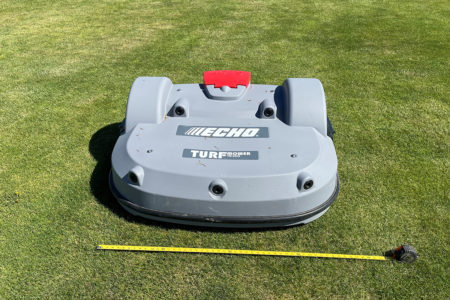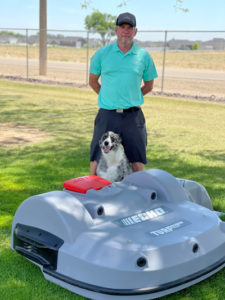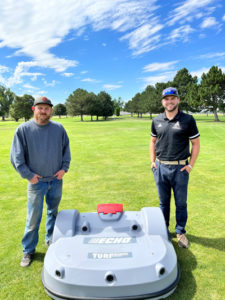Purple Sage: Brave New…. Golf Course

by Tom Cade, Editor
Cutting-edge technology is now cutting fairways at Purple Sage.
When the city of Caldwell, Idaho’s new mayor, Jarom Wagoner, was elected earlier this year, one of the first things he did was meet with the maintenance crew of the city parks, and with the greens crew of Purple Sage Golf Course. Owned by the city of Caldwell, Purple Sage is one of the more popular munis in Idaho.
Wagoner told the crew he wanted to update the machinery and technology for all the city’s equipment. “He was very clear about what he was looking for,” said Ken Wheeler, longtime head superintendent at Purple Sage. “He took a look at what we had on hand, asked us a few questions, discussed the idea of buying autonomous mowers, took a look at the budget and our staffing issues, and said, ‘Go do it.’”
Wheeler went to an equipment conference in the spring, did some research, and in mid-June three Echo brand Turf-Mower 2000s arrived at the Purple Sage equipment shed.

“The city bought six of the mowers,” Wheeler says. “We’ll use three of them here at the golf course, and the other three will be used at the city parks and ball fields.”
The mowers are electric, can run for two hours on a single charge, and are 41 inches in width. Each mower can cut six acres in two days’ time. Wheeler uses two of the mowers to maintain his driving range, and one mower that takes care of a section on the golf course. They are the only autonomous mower fleet in the state of Idaho.

“I guess you could call me the guinea pig for this,” Wheeler says with a grin. “I’m still a little skeptical about using them, but I’m happy with the results so far. I didn’t think they could keep up, but so far no complaints.”
Wheeler can program the mowers from his cell phone, but if someone touches the mowers they stop, and Wheeler has to go out and manually re-set them. “We posted signs that say, ‘You will lose golfing privileges if you touch these mowers,’” he said.
According the Wheeler, the mowers are already being used heavily in Europe. “They don’t have the restrictions that we have in the U.S.” he said. “And they are already set up with GPS in being able to remotely control the mowers. We don’t have the GPS yet here in the U.S. for this.” So Wheeler and his crew have had to string wire as a boundary for the mowers.
“They are basically like giant Roombas at the moment,” Wheeler says. “Just like in your living room, they head in one direction until they bump into something, and then they head in another direction. Once we have GPS set up, we’ll be able to take the wires down and program them for where we want them to go.”
Wheeler says he can see the future of these mowers. “I have 125 acres of turf I need to maintain,” he says, “and it’s hard to keep up with it. It is difficult these days finding anyone to hire, and even when I can find someone they usually only want to work part-time, so using these self-mowers has been a good thing so far.” He says the mowers save him about five man-hours per week.






